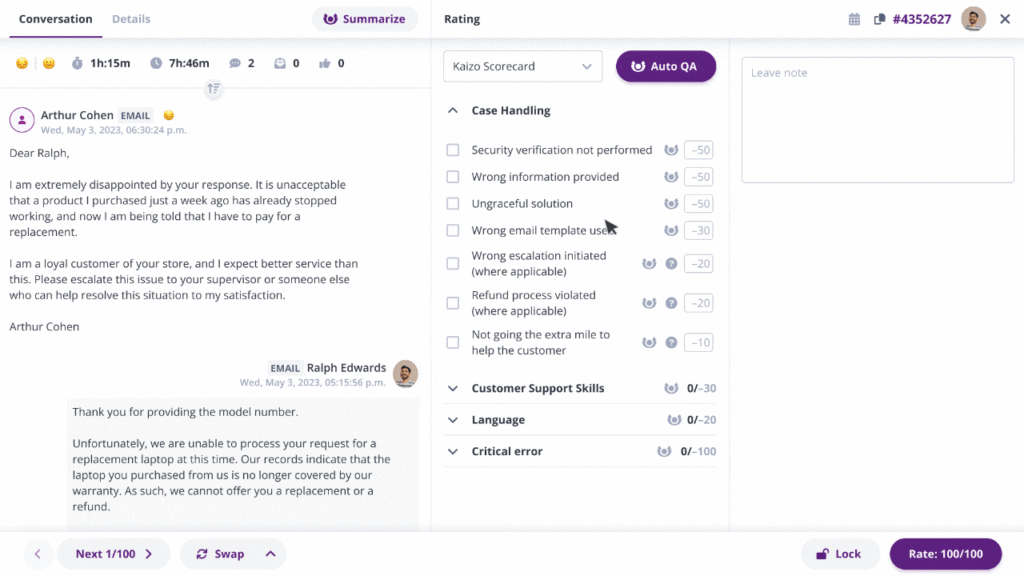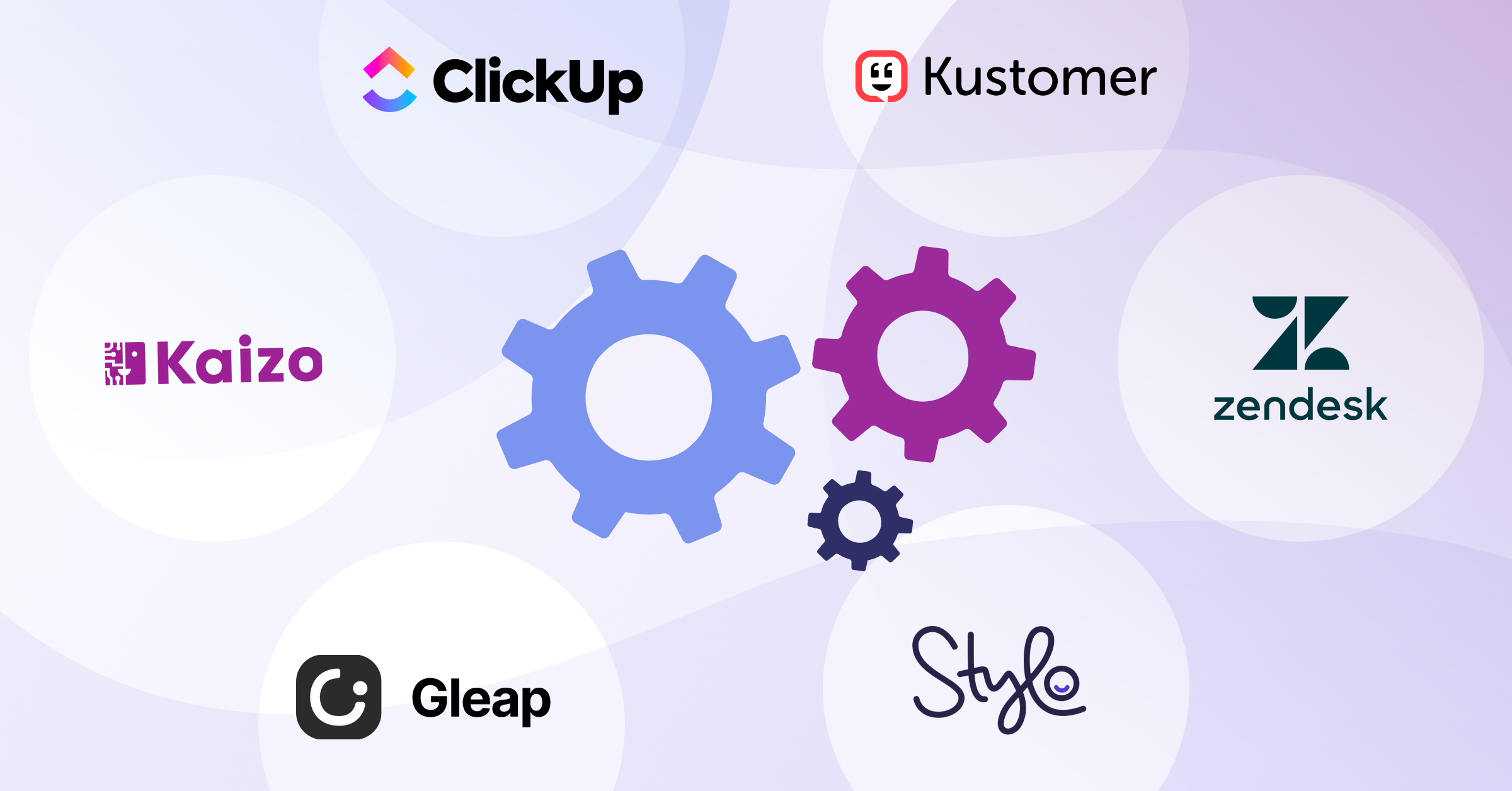Welcome to the future of customer support!
And it’s all about harnessing the power of cutting-edge AI tools for customer service.
As customers have ever-growing requirements, integrating AI tools into your service toolkit has become a must. Whether you’re planning on implementing intelligent chatbots or advanced QA analytics, these AI-powered solutions will change the way you engage with and support your clientele.
In this guide, we’ll explore why AI tools should be a fundamental component of your customer service tool stack and what options you should consider for improving the efficiency and effectiveness of your support channels.
Why do you need AI for customer service?
With AI tools for customer service, you can automatically evaluate and rate every customer inquiry, drastically accelerating the quality assurance process. By quickly identifying issues and trends, AI enables your team to address concerns promptly and enhance overall service quality.
And if you need a helping hand, AI-powered chatbots and knowledge bases empower customers to find answers to their queries independently, without human intervention. Self-service support not only reduces the workload on your support team but also provides customers with instant assistance, leading to higher satisfaction levels and improved efficiency.
This also means you can reach your customers across various communication channels. By deploying AI-powered solutions, businesses can deliver consistent and personalized support experiences across all channels, meeting customers wherever they are and ensuring a cohesive brand experience.
Ready to scale? AI-driven translation and localization capabilities break down language barriers, letting you engage with customers worldwide without compromising quality.
Kaizo – for automated QA, performance management, and workforce engagement

Kaizo should be your go-to choice for automating quality assurance. But its AI capabilities extend beyond QA. This means you can use the platform to maximize rating efficiency, keep engagement rates high, or drive better performance through targeted coaching and intelligent goal setting and tracking.
Most of Kaizo’s features also leverage the latest artificial intelligence advancements. For instance, Kaizo’s Samurai provides support leaders with a robust set of AI-powered tools seamlessly integrated into their current workflows. This way, you can effortlessly monitor, evaluate, coach, and inspire customer support teams in seconds.
Notable AI features:
- Auto QA (automated ticket analysis)
- Samurai AI assistant (Phone Call Transcription, AI Summary, Agent’s Empathy Score, Customer Sentiment Metric)
- AI-driven workforce engagement via gamified Missions
📝 Effortless transcription can happen! Kaizo’s Samurai AI extension automatically transcribes calls in over 50 languages. Try Samurai!
Other use cases for customer service:
- Performance coaching (real-time agent communication, one-on-one meeting cards, Coaching Cards)
- Performance insights (KPI setting and tracking, real-time performance data on 30+ metrics, performance metrics dashboards, graphs, and charts)
- Seamlessly integrating QA within Zendesk and Salesforce
ClickUp – for project management

You can also use ClickUp to keep all customer inquiries in one centralized hub, prioritize critical tickets, and delegate them to the right agent. ClickUp also allows for seamless communication within tasks. Agents can leave comments, ask questions, or provide updates directly within a task, keeping all communication centralized.
Notable AI features:
- Task, comment, and document summaries
- AI-based translation and localization
- Ask ClickUp AI
- Generative AI writing
- AI-generated subtasks
Other use cases:
- Task management
- Project planning
- Team collaboration
- Document management
- Goal tracking
- Time tracking and reporting
- Workflow automation
- Resource management
Gleap – for chatbots

Gleap allows you to create customized chatbots and conversational flows tailored to your specific needs. You can design chatbots to handle common customer inquiries, provide support, gather information, and more. You can also train your chatbots to understand and respond to a wide range of customer inquiries and continuously optimize them to improve their accuracy and performance.
Notable AI features:
- Custom chatbot builder
- Kai, AI support bot
Using it for customer service + other use cases:
- In-app bug reporting
- Live chat
- Marketing automation
- Product tours
- Product roadmap
- Knowledge base
- Surveys
Kustomer – for self-service

With Kustomer AI-assisted knowledge base builder, you can set up different help centers tailored to diverse audiences, regions, or brands, while localizing content into more than 76 languages. Additionally, Kustomer provides a unified view of all your customer data, allowing support agents to access all information (e.g. past interactions, purchase history, preferences) about a customer in one place.
Notable AI features:
- KIQ Customer Assist: AI customer service bot
- AI-assisted CRM-powered resolutions
- Knowledge base builder
Using it for customer service + other use cases:
- Multichannel support: live chat, social messaging, email, forms, voice, SMS, push notifications
- Auto-translation for 70+ languages
- Performance reporting
- CRM
Zendesk – for multichannel support

Use Zendesk bots to handle repetitive requests, making use of their pre-trained capabilities pulled from millions of HR and IT interactions. You can also set up intents to direct sensitive topics directly to the appropriate teams, allowing everyone to focus on their tasks. You might also find Zendesk’s knowledge base feature useful to provide self-service options and empower customers to find answers to common questions independently.
Notable AI features:
- Generative AI for automatically writing support articles and deploying bots
- Bot builder and generative AI-powered bots
- Key insights (ticket and call summary, similar tickets, and resolution suggestions)
- Ticket triage and sorting
- Knowledge base builder
Other use cases for customer service:
- Ticket management
- Self-service support
- Live chat
- Help desk management
- Customer feedback management
- Community forums
- Social media management
- Analytics and reporting
- Sales and CRM integration
- Workflow automation
- Workforce engagement
🚁 Rate tickets directly within Zendesk! Save time and avoid tab jumping by bringing Kaizo’s Auto QA capabilities into Zendesk. Try for free!
Stylo – for AI assistance in multiple languages

Stylo does one thing exceptionally well: it automatically translates messages to and from any language. Stylo Assist’s Zendesk AI assistant understands your customers’ problems, finds a solution using your knowledge base content, and writes replies for your agents to paste directly into the ticket. The only thing to note is that it only works within Zendesk [A Shopify add-on will soon be launched].
Notable AI features:
- Zendesk AI assistant that leverages generative AI for reply suggestions
- Ticket summaries and translation
- Resource suggestion
Other use cases for customer service:
- Automated ticket routing and triage
- Frustration, Urgency, Delight, Predictive CSAT and NPS
Where to start with using AI tools for customer service
While you can use all of the AI-powered solutions above to cater to different aspects of customer service (such as chatbots for instant support and sentiment analysis for customer feedback), start by identifying specific use cases where AI will add the most value to your customer service operations.
Evaluate which tasks or processes will still require human intervention and which ones you can pass over to an “AI colleague”. This will help you determine where automation can yield the most significant benefits and where human touchpoints are essential for maintaining a personalized customer experience.
Prioritize the use cases that align with your business objectives and customer needs. You can take your overarching customer service goals and decide based on those. For instance, if you want to automate repetitive tasks to improve performance and optimize response times, you’ll want to pair an AI-based QA solution with a self-service platform.
📝 Help your agent understand customers better! Kaizo’s Samurai AI extension automatically transcribes and summarizes tickets so QA experts and team leads can make informed decisions and streamline their evaluation process. Try Samurai!


